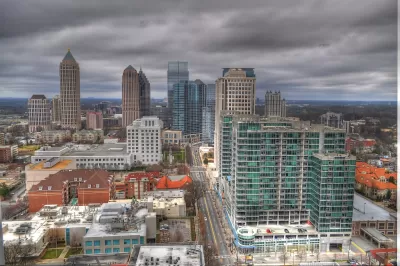The southern city’s growth is prompting questions about how to increase the housing supply, maintain affordability, and accommodate new residents.

The debate between those who want to preserve single-family zoning and housing advocates who say increases in density are necessary to make housing affordable is heating up in cities and non-urban areas around the country as the housing crisis spreads. As Sean Keenan reports in Atlanta Civic Circle, Atlanta is no different.
In metropolitan Atlanta, “NIMBY” groups concerned about ‘neighborhood character’ and the negative impacts of density increases are finding themselves in conflict with growth advocates who say increasing density is the only way to keep housing affordable for all income levels.
According to Abundant Housing Atlanta co-founder Alison Grady, “Atlanta is becoming more and more unaffordable, in large part due to the outdated zoning code that encourages suburban sprawl and huge homes on huge properties and discourages—or outright bans—more affordable options, such as tiny homes, duplexes, and small apartment and condo buildings.” Now, cities in the Atlanta metro are rewriting decades-old zoning codes to accommodate more growth and create more affordable housing for a growing population. “If Atlanta, Clarkston, and other metro-area cities truly want to make intown living attainable for lower-income residents—and ‘mitigate some of the negative social and environmental impacts of urban sprawl’—upzoning should be part of the equation,” says Sonia Hirt, a planning scholar from the University of Georgia. Atlanta itself is undergoing a revision of its zoning code, scheduled for completion in summer 2024, while other local cities are loosening regulations on ADUs and other ‘missing middle housing.’
FULL STORY: As metro Atlanta cities rewrite zoning laws, will they follow national trend of embracing density?

Maui's Vacation Rental Debate Turns Ugly
Verbal attacks, misinformation campaigns and fistfights plague a high-stakes debate to convert thousands of vacation rentals into long-term housing.

Planetizen Federal Action Tracker
A weekly monitor of how Trump’s orders and actions are impacting planners and planning in America.

In Urban Planning, AI Prompting Could be the New Design Thinking
Creativity has long been key to great urban design. What if we see AI as our new creative partner?

King County Supportive Housing Program Offers Hope for Unhoused Residents
The county is taking a ‘Housing First’ approach that prioritizes getting people into housing, then offering wraparound supportive services.

Researchers Use AI to Get Clearer Picture of US Housing
Analysts are using artificial intelligence to supercharge their research by allowing them to comb through data faster. Though these AI tools can be error prone, they save time and housing researchers are optimistic about the future.

Making Shared Micromobility More Inclusive
Cities and shared mobility system operators can do more to include people with disabilities in planning and operations, per a new report.
Urban Design for Planners 1: Software Tools
This six-course series explores essential urban design concepts using open source software and equips planners with the tools they need to participate fully in the urban design process.
Planning for Universal Design
Learn the tools for implementing Universal Design in planning regulations.
planning NEXT
Appalachian Highlands Housing Partners
Gallatin County Department of Planning & Community Development
Mpact (founded as Rail~Volution)
City of Camden Redevelopment Agency
City of Astoria
City of Portland
City of Laramie





























